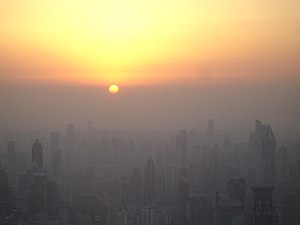Recent Developments in China Air Pollution by Barry Lough
China has seen great economic development over the decades. This has taken place largely to the benefit of their population, but some problems have arisen. Air pollution in China has become quite a significant concern. They are aware of it of course and some progress has been made in rectifying it. That said, they have a long way to go.
Since 2007, China has been the world's #1 emitter of greenhouse gases, making air pollution in Asia, including China, a serious global issue. It is at least as serious a problem for the Chinese people. Chinese air quality contributes to the deaths of three quarters of a million people every year, according to the World Health Organization (WHO).
China's economic growth, combined with industrial equipment that could now be replaced with cleaner technology, is largely responsible for the current Chinese air pollution situation. A major example is cement making. China's construction and infrastructure-building boom have led to this country becoming the world's leading maker of cement. Just over half the worldwide output now comes from China. Concrete production is polluting and highly energy intensive and methods currently used in China compound the problems.
Many producers use inefficient shaft kilns, which the West started to abandon at the beginning of the 20th Century. Overall, 6% of the nation's electricity is used in operating cement-making plants, and much of it is wasted. These unscrubbed kilns also emit vast quantities of mercury, carbon monoxide, carbon dioxide, sulfur dioxide, particulate matter, and other polluting and toxic substances. Being unscrubbed also means that the facility is operated without the use of additional technology specifically designed to reduce emissions.
Much of the power requirement of these kilns is met by old-fashioned, unscrubbed coal-burning power plants. Almost 70% of China's electrical demands are met using coal. The overwhelming majority of China's greenhouse gas emissions come from this type of source and fuel.
These issues came to the fore during the 2008 Beijing Olympic Games, which opened with the city clouded in smog. Although the skies did clear up, to what degree air quality improved is a subject of speculation. The Chinese government closed the only independent agency monitoring air pollution in Beijing, the Cambridge Environmental Research Consultants (CERC), for the duration of the games.
The data available comes from either independent, but untrained journalists, or the Chinese government and the impartiality of these numbers has been identified as suspicious. Even if the Chinese officials accurately reported China air quality statistics, the standards used for comparison leave something to be desired. While they consider any day with a particulate matter rating below 100 to be a "Blue Sky Day," the WHO draws their line at 50.
They are making some efforts to reverse the trend towards ever-greater air pollution. Their reforestation project, "the great wall of green," will become the world's single greatest re-planting of forest when completed. However, the country's progress in other ways has been less promising. In 2000, their government promised that it would reduce the China air pollution by 10 percent by the year 2005. However, China grew to surpass the United States as the world's biggest greenhouse gas emitter.
http://www.stuffintheair.com/ home page for author's meteorological website.
http://www.stuffintheair.com/China-air-pollution.html gives more detail on China air quality.
Article Source: http://EzineArticles.com/?expert=Barry_Lough
http://EzineArticles.com/?Recent-Developments-in-China-Air-Pollution&id=2505893
http://psychedelichippiemusic.blogspot.com/
http://psychedelichippiefashion.blogspot.com/
http://www.soul-flower.com/Merchant2/merchant.mvc?Screen=SFNT&Store_Code=SOS&AFFIL=Robert_Muller
![Reblog this post [with Zemanta]](http://img.zemanta.com/reblog_e.png?x-id=f054838d-a29f-43a4-b0b4-e7535d9764e9)

China’s pollution is a huge problem that needs to be addressed as soon as possible. This article was a great supplement to my knowledge about pollution in Asia. I read a Special Article at the Asia Economic Institute (www.asiaecon.org) titled, “China’s Pollution and Alternative Measures to Save the Environment” that highlighted the effects of China’s industrialization on Chinese citizens’ health and the rest of the world. It also offered alternative ideas, such as Nuclear Energy and China’s efforts to address the issue.
ReplyDeleteChina’s pollution is a huge problem that needs to be addressed as soon as possible. This article was a great supplement to my knowledge about pollution in Asia. I read a Special Article at the Asia Economic Institute (www.asiaecon.org) titled, “China’s Pollution and Alternative Measures to Save the Environment” that highlighted the effects of China’s industrialization on Chinese citizens’ health and the rest of the world. It also offered alternative ideas, such as Nuclear Energy and China’s efforts to address the issue.
ReplyDelete